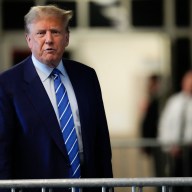TEGUCIGALPA, Honduras – Business and political leaders who backed the coup overthrowing President Manuel Zelaya now are considering the unthinkable: returning him to office with limited powers.
The reversal, and Zelaya’s decision to consider it, reflect the growing desperation to resolve a three-month standoff that has turned this Central American country upside down.
John Biehl, special adviser to the Organization of American States, said Wednesday he sensed some movement toward talks.
“The moment has arrived for tempers to cool and reason to reign, and that’s when errors will start being corrected,” Biehl said. “I have found a strong willingness for dialogue,” adding he had heard of proposals to return Zelaya to office briefly.
The crisis sparked by the June 28 ousting of Zelaya has paralyzed the already impoverished nation.
Honduras has been bleeding millions of dollars a day, and many of its most prominent CEOs have had their visas revoked by the United States, hampering their efforts to do business. Nations have cut aid to demand the ousted leader’s reinstatement while sporadic spikes in tensions have forced the closure of airports, border crossings and factories.
The final straw was the interim government’s decision to impose a surprise emergency decree that suspended civil liberties this week and further damaged the administration’s image at home and abroad.
Lawmakers immediately made clear Congress will revoke the emergency security crackdown if the interim government does not, said Rigoberto Chang, a congressman with the conservative National Party.
The disagreement over the decree was the biggest public rift between interim President Roberto Micheletti and the Congress that put him in power after soldiers forced Zelaya into exile.
After that happened, Honduras’ powerful elite told Micheletti enough is enough, and back-room negotiations began on a powerful business chamber’s proposition to put him back in office with limited powers.
Zelaya has said he was encouraged by the proposal and hoped to be in talks with its authors by Wednesday.
Its chief proponent, Adolfo Facusse, president of the National Industry Chamber, suggests sending 3,000 troops from conservative-led nations to Honduras if the leftist leader is restored to office to ensure he does not overstep his limited authority.
Facusse told The Associated Press that the force could be U.N. peacekeepers.
Facusse, whose association vocally supported Zelaya’s ouster, said he discussed parts of the plan with Micheletti, including a proposal to make the interim president a congressman-for-life.
Micheletti on Wednesday called parts of the plan impossible but indicated he was analyzing some of its points.
“This involves things we cannot do, because our constitution does not permit it,” he said, referring to the presence of foreign troops or U.N. peacekeepers. “But of course we will take into consideration the points he has expressed in his proposal, in his dream to bring peace to Hondurans.”
Micheletti did not directly address the issue of reinstating Zelaya, something he has strongly opposed thus far.
The interim leader is becoming increasingly isolated as pressure mounts from the nation’s power brokers – including lawmakers, presidential candidates and the business elite – who are demanding a break in the stalemate.
Porfirio Lobo, a top conservative presidential contender, announced that Congress would be open to passing reforms needed to make an accord work.
“The issue is confrontation or dialogue, bloodshed or peace,” the National Party candidate said.
“If we have to reform some laws, I don’t think Congress is going to be an obstacle,” added Lobo, whose party is the second force, with 55 seats, in the 128-seat congress.
The coup’s aftermath has presented a tortuous path for presidential candidates trying to campaign ahead of the Nov. 29 elections.
Micheletti sees the balloting, which will produce an entirely new leader, as the country’s best hope for emerging from the crisis. But the international community has made it clear that the elections will not be considered valid unless Zelaya is reinstated.
The vote was scheduled before the removal of Zelaya, whose presidential term expires in January.
Micheletti so far has been staunchly opposed to reinstating Zelaya and has been on the defensive since Zelaya sneaked back into the country on Sept. 21 and took refuge at the Brazilian Embassy.
Brazil has expressed concern about the security of the Embassy, where about 60 Zelaya supporters are holed up with the ousted president. Honduran troops and police have surrounded the building.
Six Brazilian legislators were heading to Honduras on Wednesday to check on the South American country’s citizens in Tegucigalpa, the state-run Agencia Brasil news agency reported.
Meanwhile, soldiers and police have continued enforcing the security decree despite Micheletti’s promises to lift it, putting at risk efforts to restart talks. Micheletti suggested Wednesday it would be in force for at least two more days, as he holds meetings on the proposals for ending the decree.
About 150 police and soldiers acting on the decree Wednesday raided the offices of the National Agrarian Institute, occupied by Zelaya supporters since the coup. Authorities detained 54 people, many farm activists, police spokesman Orlin Cerrato said.
“The decree is being discussed by a lot of sectors, and appeals have been filed,” he said. “But it remains in force.”
Cerrato said the building contains valuable land title records. One of the detained activists, farmer Jose Irene Murillo, 69, said he feared “they are going to destroy the records of the small farmers, because the big landowners want the land.”
Congress can lift or modify the decree issued Sunday that bans unauthorized gatherings and lets police arrest people without warrants, rights guaranteed in the Honduran Constitution. It also allows authorities to shut news media for statements that it sees as disturbing the peace or attacking the law.
















